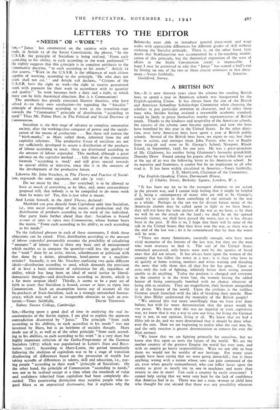LETTERS TO THE EDITOR
" NEEDS " OR " WORK " ?
srR,—" Janus has commented on the surprise with which one finds, in Article 12 of the Soviet Constitution, the phrase, " In the U.S.S.R. the principle of Socialism is being realised, ` From each according to his ability, to each according to the work performed.' " He rightly suggests that this principle is in complete antithesis to the Communist doctrine, " to each according to his needs." Article 12 also asserts, " Work in the U.S.S.R. is the obligation of each citizen capable of working, according to the principle, ` He who does not work shall not eat, " and Article 118 declares, " Citizens of the U.S.S.R. have the right to woilt—the right to receive guaranteed work with payment for their work in accordance with its quantity and quality." So work becomes both a duty and a right, to which there can be little theoretical objection. But is it Communism?
The antithesis has greatly exercised Marxist theorists, who have solved it—to their own satisfaction—by regarding the " Socialist " principle of distribution according to work as the transition-stage towards the " Communist " principle of distribution " according to need." Thus Mr. Palme Dutt, in The Political and Social Doctrine of Communism.
Socialism is the first stage of advance to complete communist society, after the working-class conquest of power and the sociali- sation of the means of production . . . But there still remain the " birth-marks," as Marx called them, inherited from the old capitalist relations. The productive fc•rces of socialism are not yet. sufficiently developed to assure a distribution of the products of labour according to need: these are distributed according to the amount of labour expended. This method, although a great advance on the capitalist method . .. falls short of the communist formula " according tc, need,' and still gives special rewards to special ability or initiative, since this is in the interests of the development of the productive forces.
Likewise Mr. John Strachey, in The Theory and Practice of Social- inn, expounds the same argument, and asks (p 112): Do we mean by that . . that everybody is to be allowed to have as much of everything as he likes, and, more extraordinary proposal still, that nobody is to be compelled to do more work than he wants to? Yes, this is just what is meant.
And Lenin himself, in the April Theses, declared: Mankind can pass directly from Capitalism only into Socialism, i.e., into social ownership of the means of production and the distribution of products according to the work of the individual. Our party looks farther ahead than that: Socialism is bound sconer or later to ripen into Communism, whose banner bears the motto, " From each according to his ability, to each according to his needs."
To the italicised phrases in each of these statements, I think these objections can be raised. First, distribution according to the amount of labour expended presumably assumes the possibility of calculating " amounts " of labour : but is there any basic unit of measurement which enables us to compare the quantity—still less the quality—of the " work " done by an artist, doctor, schoolmaster or politician with that done by a miner, ploughman, hotel-porter or a machine- minder? Secondly, is not Mr. Strachey confusing two quite different ideals—distribution according to need, which demands the provision of at least a basic minimum of subsistence for all, regardless of ability, which has long been an ideal of social justice in liberal- democratic thought—and distribution according to desires, which is a far more utopian ideal? Thirdly, it seems to be a pure act of faith to assert that Socialism is bound, sooner or later, to ripen into Communism. Such an assumption leaves out of account all the by-products of State-Socialism, such as a strongly entrenched bureau- cracy, which may well act as insuperable obstacles to such an evo-
lution.—Yours faithfully, DAVID THOMSON. Sidney Sussex College, Cambridge.


























 Previous page
Previous page